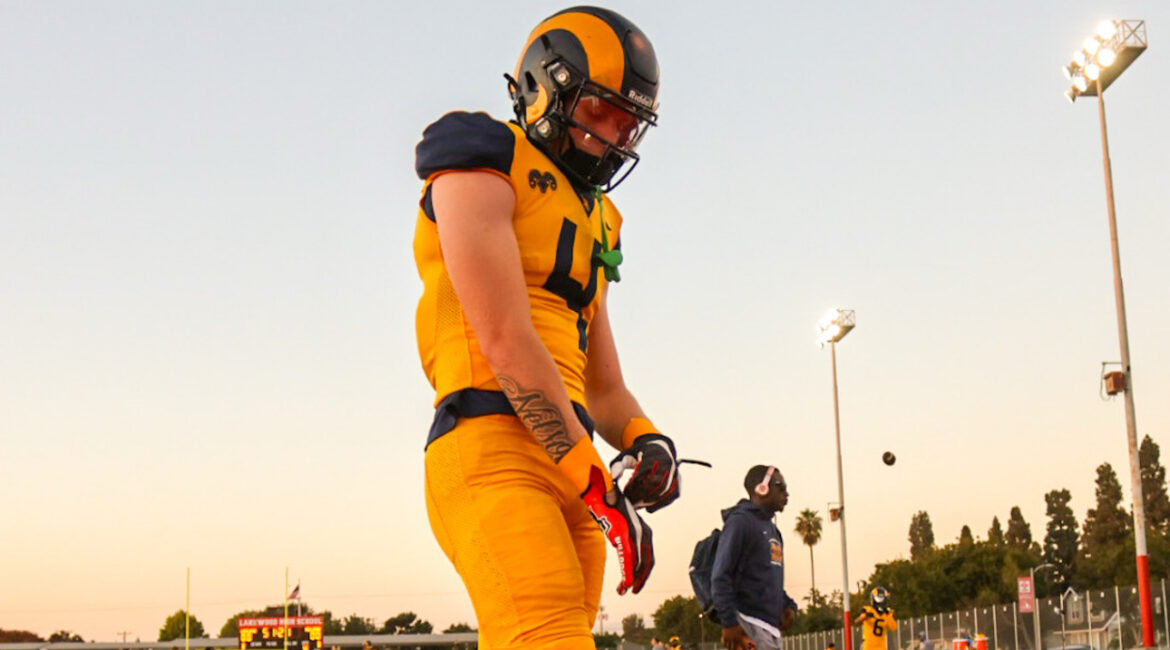By Bill Prentice, Reporter/Columnist for RepMax Media
April 18, 2025
In the highly competitive world of high school football recruiting, understanding what drives elite prospects has become essential for college programs looking to attract top talent. For Jude Nelson, the standout tight end and defensive end from Millikan High School, the journey toward collegiate football is shaped by a powerful personal mission that extends beyond the field.
“What drives me is the fear of not making it. I want to give my family a better life, and that’s why I go so hard,” Nelson shared in our exclusive interview. His combination of size, elite route-running ability, and defensive aggression has positioned him as a dual-threat player garnering attention from college recruiters across the country.
As college programs evaluate prospects like Nelson, they’re increasingly recognizing that today’s student-athletes are looking beyond just playing time and national exposure. They’re seeking environments that foster both athletic and personal growth – something Nelson emphasized throughout our conversation about his recruitment journey.
Who is Jude Nelson? The Two-Way Threat Making Waves at Millikan
Standing out at tight end and defensive end positions requires a rare combination of physical attributes and technical skills. Nelson has developed his game by studying the best in the business.
“I play tight end because of my size and my skill set. Running routes, my hands, and blocking make me elite,” Nelson explained when discussing his offensive strengths. “On the defensive side, I play defensive end. My skill set there is based on speed and aggression.”
Nelson’s development hasn’t happened by accident. He’s modeled his game after one of college football’s recent breakout stars.
Q: Which professional athlete or figure do you look up to, and what have you learned from their journey?
Nelson: “I look up to Brock Bowers. I’ve learned many things from him, like body control, route running, creating separation, and making plays at my size.”
This deliberate approach to skill development highlights how today’s prospects are studying the game more analytically than ever before. Nelson’s focus on specific technical elements shows a player who understands what separates good players from elite ones.
What does your high school prospect look for in a position coach? Share your experiences in the comments below.
The Academic Balancing Act: How Elite Prospects Manage School and Sports
For high-caliber recruits like Nelson, maintaining academic eligibility isn’t enough – they’re seeking to build the foundation for success beyond football. This commitment to academics often requires difficult choices.
Q: How do you manage the demands of being an elite prospect while keeping up with academics and personal life?
Nelson: “I balance it through doing schoolwork every day no matter what. Sometimes you’ll have to miss workouts to study for a test or complete homework.”
In an era where NIL deals and transfer portals have transformed college athletics, Nelson’s perspective reflects the maturity today’s prospects bring to their decision-making process. They understand that their academic performance will ultimately determine their long-term success, regardless of their athletic achievements.
What College Programs Should Know About Today’s Football Recruits
When college recruiters connect with prospects like Nelson, understanding their priorities can make all the difference. Nelson identified three key factors that will influence his college decision.
Q: What are the top three factors you’re considering when choosing a college?
Nelson: “Location, culture, and how I fit in the offense.”
His response offers valuable insight into what matters to today’s recruits. While traditional powerhouse programs might offer national exposure, prospects are increasingly factoring in cultural fit and schematic alignment when making their decisions.
Q: How much does the fan base and game-day atmosphere influence your college decision?
Nelson: “Obviously, it would be a big plus to a place if they had an awesome atmosphere.”
“I strive to be the leader that someone was for me my freshman and sophomore year. I want to be the senior that people can look up to.” – Jude Nelson
College programs that can demonstrate how they develop players as people, not just athletes, may find themselves with a recruiting advantage. Nelson emphasized this when discussing coaching preferences.
Q: Would you rather play for a coach who prioritizes winning above all or one who focuses on player development and long-term growth?
Nelson: “I would want to play for a coach that focuses on both these things. Developing me is a big thing, but I’m also a very competitive person and want to win.”
This balance between development and competitiveness was a recurring theme in Nelson’s responses, suggesting that today’s recruits are looking for programs that can deliver both immediate success and long-term growth.
The Coaching Connection: What Style Brings Out the Best in Modern Athletes?
 Understanding the coaching dynamics that resonate with Generation Z athletes can help programs better connect with prospects. Nelson was clear about the coaching approach that works best for him.
Understanding the coaching dynamics that resonate with Generation Z athletes can help programs better connect with prospects. Nelson was clear about the coaching approach that works best for him.
Q: What type of coach brings out the best in you—strict and disciplined, more player-friendly, or a mix of both?
Nelson: “A combination of player-friendly and joke-cracking coach but also locked in when the time comes.”
“What drives me is the fear of not making it. I want to give my family a better life, and that’s why I go so hard.” – Jude Nelson
This preference for a balanced coaching style suggests that today’s athletes respond best to coaches who can build relationships while maintaining high standards. The days of the one-dimensional, authoritarian coach may be fading as players seek mentors who understand them as individuals.
How important is a coach’s personality in your recruiting decision? Tell us what you think in the comments section.
Training Philosophies That Attract Top Prospects
College programs invest millions in training facilities and methodologies, but understanding what resonates with recruits can help them allocate these resources more effectively.
Q: What does your ideal training environment look like—high-intensity competition, skill-focused drills, or a mix of both?
Nelson: “A mix of both.”
“I balance it through doing schoolwork every day no matter what. Sometimes you’ll have to miss workouts to study for a test or complete homework.” – Jude Nelson
Nelson’s answer reflects the evolving understanding of athletic development. Today’s prospects recognize that both competitive scenarios and focused skill development are necessary for reaching their potential. Programs that can demonstrate this balanced approach may have an edge in recruiting conversations.
Key Insights for College Recruiters and High School Athletes
From our conversation with Jude Nelson, several important takeaways emerged that could benefit both college programs and aspiring recruits:
- Purpose-driven motivation – Nelson’s desire to create a better life for his family provides powerful motivation that extends beyond personal glory.
- Balanced coaching preferences – Today’s athletes respond best to coaches who can build relationships while maintaining high standards and competitive focus.
- Holistic development – Prospects are seeking programs that develop them as complete athletes and people, not just specialists in one area.
- Academic commitment – Elite prospects understand that their academic performance will ultimately determine their long-term success.
- Cultural and schematic fit – Location, program culture, and offensive/defensive fit are often more important than traditional program prestige.
For high school athletes navigating their own recruitment journeys, Nelson’s approach offers a valuable template. His focus on development, academic balance, and finding the right cultural fit demonstrates the maturity college programs are seeking in their recruits.
What’s Next for High School Football Recruiting?
As college football continues to evolve with NIL deals, transfer portal dynamics, and conference realignments, the recruiting landscape will undoubtedly change with it. However, the fundamental desire for development, connection, and opportunity that Nelson articulated will likely remain constant.
For programs seeking to connect with top prospects, understanding these motivations and demonstrating how they can meet these needs will be crucial. The most successful recruiters will be those who see beyond the athletic skills to the person and potential behind them.
What factors do you think will most influence high school recruiting in the coming years? Are there aspects of the process that you believe need to change? Share your thoughts in the comments below, and join the conversation about the future of college football recruiting.
About the Author: Bill Prentice is a Reporter/Columnist for RepMax Media specializing in high school and college football recruiting. You can reach him at bill.prentice@repmax-qr.com or visit www.repmaxmedia.com for more exclusive recruiting content.

Great article!! Jude is so talented. I’ve enjoyed watching him grow over the years. So proud of him!
Very good https://shorturl.at/2breu
Good https://shorturl.at/2breu
Very good https://shorturl.at/2breu
Very good https://shorturl.at/2breu
Awesome https://lc.cx/xjXBQT
Good https://urlr.me/zH3wE5
Awesome https://is.gd/N1ikS2
Awesome https://is.gd/N1ikS2
Very good https://is.gd/N1ikS2
Very good https://is.gd/N1ikS2
Awesome https://is.gd/N1ikS2